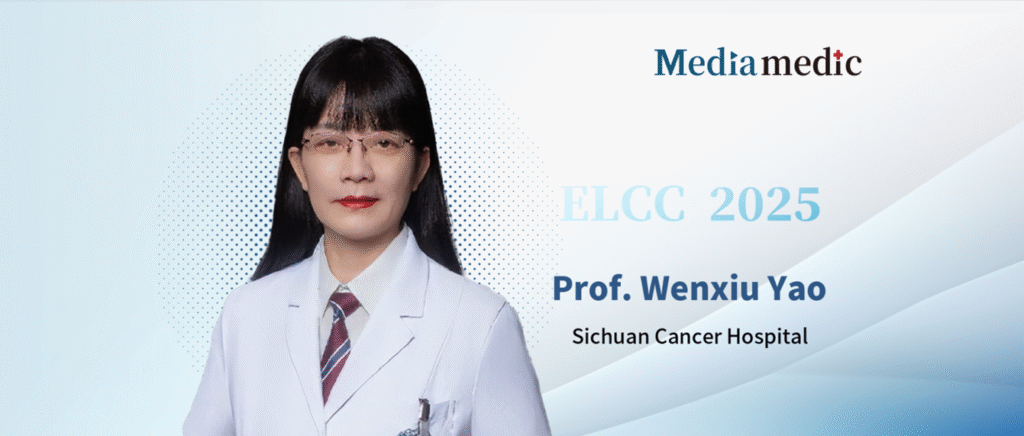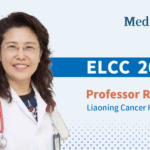
At the 2024 European Lung Cancer Congress (ELCC) held in Paris, Oncology Frontier conducted an exclusive interview with Professor Wenxiu Yao from Sichuan Cancer Hospital. Professor Yao provided in-depth commentary on the latest research presented at the congress regarding antibody-drug conjugates (ADCs) in the treatment of lung cancer.Oncology Frontier:What were the key advancements in ADC research for first-line and subsequent-line lung cancer therapy presented at ELCC 2025?
Professor Wenxiu Yao:
The 2025 ELCC featured a distinct focus compared to other major international meetings like ASCO, ESMO, and WCLC. In addition to updates on immunotherapy and targeted therapies, this year’s congress placed significant emphasis on ADCs and bispecific antibodies. Notably, a number of Phase I–III clinical trials led by Chinese research teams on ADCs and bispecific agents were showcased, highlighting impressive progress in this field.
Current ADC development in lung cancer primarily targets two key antigens: TROP2 and members of the HER family (HER2/HER3). TROP2-targeting ADCs—such as Dato-DXd—have drawn global attention. Among Chinese-developed ADCs, SKB264 (luconituzumab tesirine) by Kelun-Biotech recently received regulatory approval for the treatment of patients with locally advanced or metastatic non-squamous non-small cell lung cancer (NSCLC) harboring EGFR mutations, following disease progression after EGFR-TKI and platinum-based chemotherapy.
Several studies on TROP2, HER2, and HER3-targeting ADCs were presented at ELCC, including the ORCHARD study (Abstract 1O), which was part of the Day 1 “Proffered Paper Session 1.” The study investigated the combination of Dato-DXd with osimertinib in patients with advanced EGFR-mutant NSCLC who had developed resistance to first-line third-generation EGFR-TKIs. The results showed encouraging efficacy and manageable safety, providing hope for more treatment options in the future through continued ADC and bispecific antibody research.
Oncology Frontier:What challenges remain in the development of ADCs for NSCLC?
Professor Wenxiu Yao:
The clinical application of ADCs in NSCLC faces several challenges, including optimization of efficacy, toxicity management, and overcoming resistance. Long-term follow-up is still needed to confirm the superiority of ADCs over conventional treatments. Moreover, managing adverse effects from combination therapies involving ADCs can be difficult, and the mechanisms of resistance—as well as strategies for post-resistance treatment—require further investigation.
Oncology Frontier:What future directions could help overcome current limitations in ADC development for lung cancer?
Professor Wenxiu Yao:
To further advance ADC research and development, efforts must focus on optimizing target selection, innovating linker-payload technologies, and exploring combination strategies to enhance therapeutic efficacy. Improving safety management is also essential. Each component of an ADC—the antibody, linker, and cytotoxic payload—can influence toxicity. For instance, SKB264 has been associated with adverse events typical of chemotherapy, such as myelosuppression and gastrointestinal reactions, as well as specific side effects like oral mucositis.
Looking ahead, combining ADCs with other drugs—such as the development of bispecific ADCs—may offer synergistic effects through complementary mechanisms, potentially enhancing tumor targeting and reducing antigen escape. However, mitigating the adverse effects of these advanced therapies remains a critical area of focus.

Chief Physician, Department of Medical Oncology, Sichuan Cancer Hospital
Secretary of the Party Branch, Department of Medical Oncology
Administrative Director of the Department
PhD in Oncology
Graduate Supervisor at the University of Electronic Science and Technology of China and Chengdu Medical College
- Member, Lung Cancer Quality Control Expert Committee, National Cancer Quality Control Center
- Member, Refractory Cancer Pain Expert Committee, National Pain Quality Control Center
- Member, CRPC Refractory Cancer Pain Group
- Chair, Small Cell Lung Cancer Committee, Sichuan Anti-Cancer Association
- Founding Chair, Tumor Pain Committee, Sichuan Anti-Cancer Association
- Standing Member, Southern Oncology Clinical Research Association
- Vice Chair, Lung Cancer Committee, CSWOG
- Standing Member, Sichuan Immunology Association
- Vice Chair, Tumor Treatment Committee, Sichuan Women Physicians Association
- Vice Chair, Lung Cancer Committee, Sichuan Oncology Society
- Vice Chair, Epidemiology Committee, Sichuan Medical Association
- Recognized as an Outstanding Expert with Significant Contributions in Sichuan Province
- Vice President, MDT Committee, Sichuan International Medical Exchange and Promotion Association
- Academic and Technical Leader, Sichuan Provincial Health Commission
- Editorial Board Member, Journal of Tumor Prevention and Treatment






